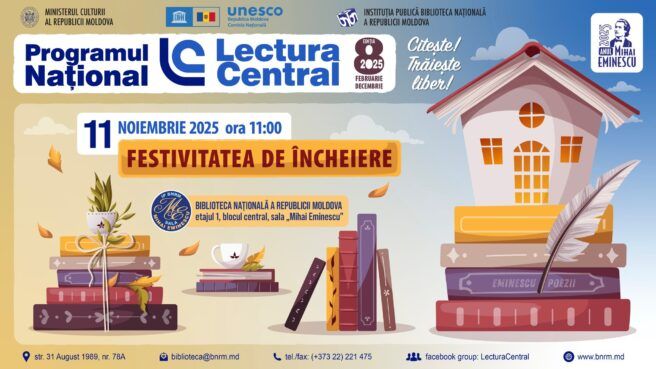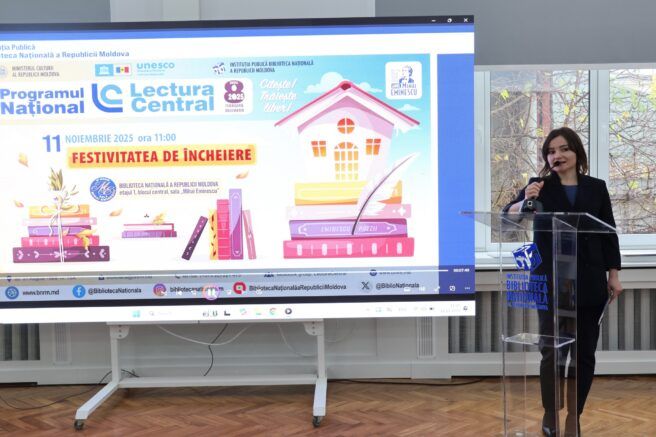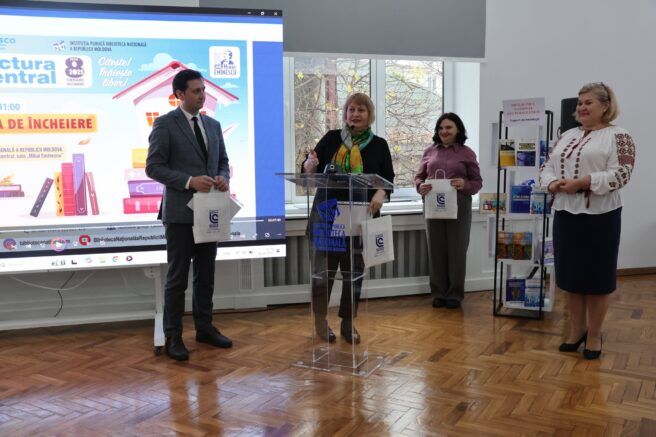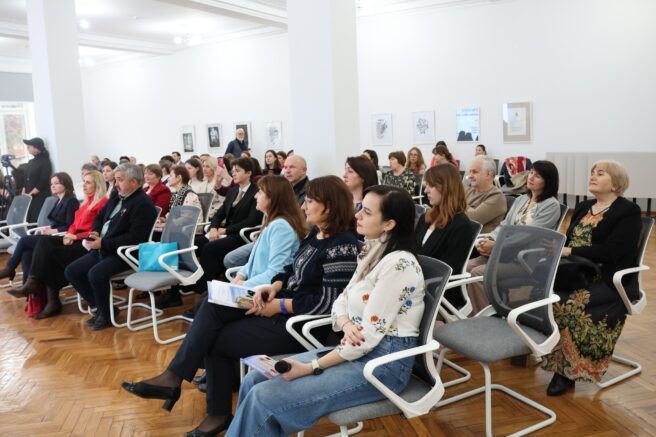After a ten-month marathon, the National Program LecturaCentral 2025 has come to an end. Throughout its seven previous editions, the team of the National Library of the Republic of Moldova (NLRM) explored and tested different formats for organising events, and it seems that by the eighth edition, in 2025, the program reached its optimal structure.

Naturally, there is much to learn from the experience of other national libraries and institutions dedicated to promoting books and reading. Particularly noteworthy are the practices of the Reading Agency in the United Kingdom; the ProLectura Foundation in Germany—where the head of state serves as honorary president; and the Book and Reading Institutes in the USA, France, Romania, and beyond.
If in its early editions the PNLC built its case for the importance of books and reading by invoking ideas, quotations, and advocacy from the great thinkers of the world, the more recent editions shifted focus toward personalities from the Romanian-speaking cultural space—especially contemporary figures active today. Now at its eighth edition, the PNLC has demonstrated that it is fully original and stands among the most significant initiatives for promoting books and reading in the region.

After eight years, it is clear that the accumulated experience can be replicated at district, municipal, and even national levels. Moreover, the PNLC serves as a model that can be adopted by other national libraries seeking to implement similar programs.
The team responsible for organizing and delivering the PNLC succeeded in convincing the Ministry of Culture of Moldova of the program’s positive impact on readers. As proof, out of the eight editions, seven were funded by the Ministry through dedicated cultural project grants.

The program’s success stems from the fact that it extends beyond the traditional scope of public libraries, engaging additional categories of libraries across the National System. The experience of the most recent edition demonstrates that no other activity of the NLRM has been so thoroughly supported with methodological resources as the PNLC. These include a range of methodological works, biographies, curated collections of quotations on libraries, books and reading, as well as training sessions and the development of trainers in the field.

Among the most notable achievements of 2025 are the following:

In 2025, significant advancements were made in the field of memory culture, beginning with the signing on 7 February 2025 of the joint order issued by the Ministry of Culture of Moldova and the Ministry of Education and Research of Moldova establishing the Memory Council.

To further stimulate library activities related to this topic, on 4 April a consultative session was organised: “The Role of the Library in Developing Positive Community Perceptions Through the Commemoration of the Victims of the 1946–1947 Famine and Stalinist Deportations: Methodological and Practical Recommendations.” Continuing this message, on 8 April a public lecture entitled “The Famine: A Community Tragedy and a Lesson of Dignity for the Future” was held, featuring as keynote speaker Ms. Larisa Turea, author of The Book of the Famine.
Since 2022, the Republic of Moldova marks the Day of Commemoration of the Victims of the 1946–1947 Famine on the third Saturday of April. In this context, on 18 April in Cahul, a commemorative event was organized under the theme “We Suffered as Few Peoples Have Suffered”, with the participation of writers Iulian Filip and Ion Hadârcă; the event was moderated by the Mayor of Cahul, Mr. Nicolae Dandiș, together with Iulian Filip.
Throughout the implementation of the PNLC, several meetings were held with author Larisa Turea, with discussions centered on The Book of the Famine. Likewise, multiple meetings and debates were organized around the memoir An Adversarial Progeny by journalist and writer Nicolae Negru.
Additional discussions related to memory culture took place during meetings with Octavian Țicu, Anatol Petrenco, and others.
Memory Culture will remain an area of major interest for librarians, particularly given its close connection to the local history and memory activities traditionally undertaken by libraries.
The core element of the 2025 edition of the PNLC was the National Campaign “The Writer at Home”, within which meetings were held with writers, experts, editors, and historians. The statistical indicators include:
These figures reflect only the activities organised and coordinated by the team of the National Library of Moldova. In turn, the regional library centres coordinated additional events involving local cultural personalities.
As for the quality indicators, it is relevant to recall the IFLA–UNESCO Public Library Manifesto (2022), which states that “The benefits of libraries in society are often seen in future generations.” In this regard, the Literary and Artistic Club “Miorița”, which operated at the National Library for 48 years starting from its founding in 1964, serves as a telling example. It stood as a rare model of cultural resilience during a period that was far from easy for national values and identity.
There exist written testimonies—an essential form of impact measurement—that demonstrate the role of “Miorița” in the national revival movement:
“It was never spoken openly, but it was understood at every meeting that we were all fighting for the same sacred cause: our mother tongue.” — Ion Druță
“‘Miorița’ was among the activities that nurtured the spirit of national awakening, advocating for the Romanian language, the Latin alphabet, and the tricolour.” — Vlad Chiriac
“This literary circle kept alive our national consciousness and love for all that is beautiful.” — Vlad Pohilă
“‘Miorița’ served as a kind of headquarters for the city’s literary circles and a valuable school in organizing their activities.” — Vitalie Tulnic
The reason for invoking the “Miorița” literary circle here lies in the fact that the “Homo Aestheticus” Literary and Artistic Club, under whose umbrella all activities of the “Writer at Home” campaign were conducted, is the direct successor of the former “Miorița” club.
Given that the Republic of Moldova now follows a clearly defined national project for the coming years—European integration—the activities carried out within the PNLC may well be framed under the theme “Promoting European Values Through Reading.” With their status as moral authorities, writers and other cultural figures can meaningfully contribute to this national aspiration. And who knows—perhaps, years from now, their involvement will be remembered just as the “Miorița” circle is remembered today for its role in the national revival.
The theme “Promoting European Values Through Reading”, introduced in the PNLC 2024 edition, remained visible throughout 2025 and continues to offer room for further development in the years ahead.
Another high-impact activity of the program is the International Conference “Reading as a Basis for Culture, Knowledge, and Development.”
Between 2019 and 2025, seven editions of the Conference were organized. The event brought together over 6,000 participants and 150 speakers from 15 countries, becoming a platform for interdisciplinary and international dialogue on the role of reading in education, culture, and society. Presentations addressed contemporary topics—from reading competency development and digitalization to the impact of artificial intelligence. The conferences promoted European values, professional cooperation, and the role of libraries as centers of learning and innovation, significantly contributing to strengthening a national reading culture and establishing reading as a strategic priority for sustainable development.
The 7th edition (9–10 September 2025) gathered, in a mixed format, representatives of libraries and the educational and cultural sectors from the Republic of Moldova, Romania, and Spain.
Speakers addressed highly relevant topics concerning the role of reading in education, culture, identity, and community—ranging from book promotion and reading clubs to reading competencies in the context of PISA assessment and the impact of artificial intelligence on written culture.
A well-defined task of the 2025 PNLC edition was the continued consolidation of loyalty among both the personalities involved in the program and the librarians from libraries hosting program activities—and, of course, among readers. Work continued with a core group of around 30 writers, while more than 20 new authors were also engaged. In this context, books by the authors participating in PNLC 2025 were purchased and distributed to libraries actively involved in the program, especially those that hosted meetings between cultural figures and the reading public.
In light of the decision of the Parliament of the Republic of Moldova to declare 2025 as the “Year of Mihai Eminescu,” special attention was dedicated to commemorating the “complete man of Romanian culture,” through multidimensional promotion of his works and related literary and artistic heritage. Two national competitions were organized around this theme.
One of the main objectives of the 8th PNLC edition is the revitalization of the library network. Activities promoting books and reading remain a reliable and highly visible way to rejuvenate and enhance the public image of libraries—a crucial factor for their future.
We continue to uphold the belief that every communal or village library can organize at least one major annual event featuring a well-known personality.
To ensure broader involvement of all individuals responsible for promoting reading, the activities were organized in a cascade model, structured on three levels:
Working in a cascade structure made it possible to reach a larger number of citizens—potential library users.
In this process, the NLRM team relied particularly on the involvement of managers of territorial and departmental library centres, specialists at the upper administrative levels, and those responsible for library activities within local councils.
For this edition, the selection of cultural personalities for events was based on requests from local communities.
As the National Library of the Republic of Moldova, in its role as the National Library System Center, the institution coordinated and organized numerous activities facilitating the engagement of end users, including:
Professional Communication in the Online Environment — Facebook
Professional communication in the online environment, facilitated through the public Facebook group “LecturaCentral”, serves as an essential tool for consolidating an active professional community that transcends geographic and institutional boundaries. It enables the exchange of experiences and best practices among libraries across the Republic of Moldova and enhances the visibility of local cultural projects.
Moreover, communication within this group fosters the development of partnerships among libraries, schools, cultural centres, NGOs, and educational institutions, which can collaborate in organising cultural events.
The LecturaCentral platform stimulates professional innovation by providing a favourable environment for developing librarians’ digital skills and adapting to current communication and information trends.
The indicators reveal a high level of engagement and interaction, confirming that “LecturaCentral” is not only a cultural program but also a strategic platform for collaborative learning and continuous professional development. Online communication thus becomes a key driver of modernising library activities and strengthening the professional identity of Moldovan librarians.
As of 12 November 2025, the group recorded:
These figures confirm that LecturaCentral is not only a cultural program but also a strategic platform for collaborative learning, community building, and modernisation of the library sector.
Conclusion
PNLC 2025 demonstrated that promoting reading is a powerful tool for community engagement, cultural development, and strengthening national identity. With its broad reach, strong partnerships, and forward-looking themes, the program reaffirms the essential role of libraries in shaping an informed, culturally connected, and European-oriented society.
Text by Vera Osoianu
Translated by Mariana Kiriakov
Links:
https://www.facebook.com/media/set?vanity=marketingbnrm&set=a.1503210624809392